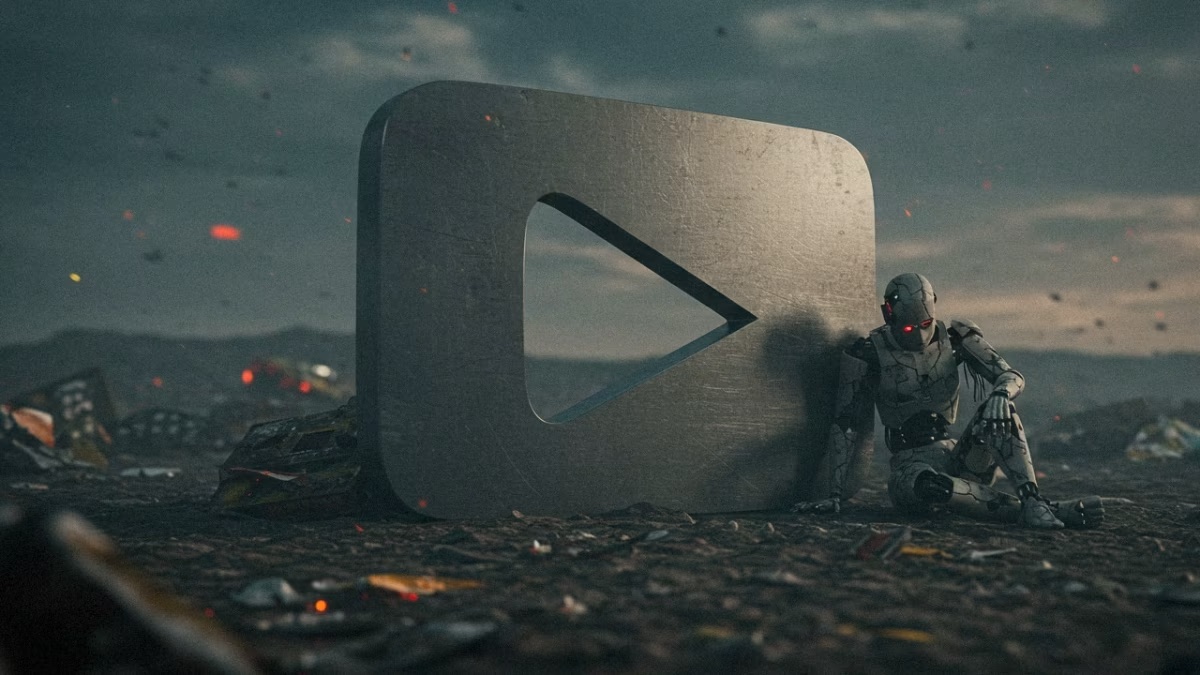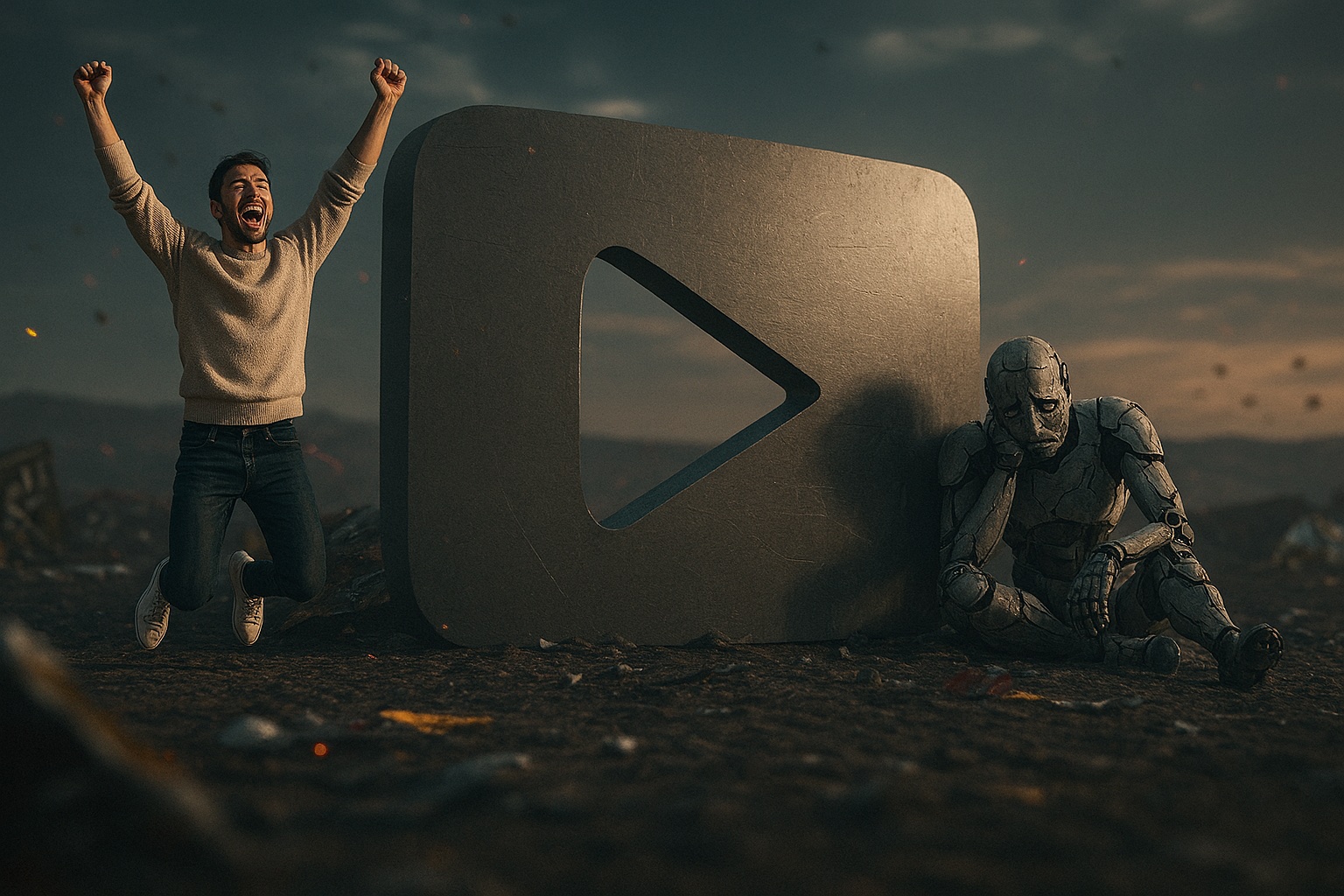YouTube Cracks Down on AI-Generated Content

YouTube Cracks Down on AI-Generated Content
YouTube's bombshell announcement has sent shockwaves through the creator community worldwide. Starting July 15, 2025, the platform will block monetization for creators pumping out what it calls "inauthentic" content—a move clearly aimed at the tsunami of AI-generated videos flooding the platform.
“YouTube has always required creators to upload ‘original’ and ‘authentic’ content,” YouTube said in its initial notification about the policy change. “On July 15, 2025, YouTube is updating our guidelines to better identify mass-produced and repetitious content. This update better reflects what ‘inauthentic’ content looks like today.”
This isn't just another policy tweak. It's a fundamental shift in how YouTube defines value in the digital age, and it's coming at a time when the creator economy is worth over $250 billion globally. For creators who've been riding the AI wave to quick profits, the wake-up call couldn't be louder.
The AI Slop Problem That's Choking Creative Feeds
Walk through YouTube today, and you'll repeatedly encounter the same pattern: synthetic voices narrating over stock footage, recycled clips masquerading as original content, and AI-generated music paired with static album covers. This digital detritus—dubbed "AI slop" by industry insiders—has become so pervasive that it's fundamentally degrading the viewing experience.
The numbers tell the story. According to recent studies, 60% of YouTube content now uses AI scripts, voices, or video elements. What started as a creative tool has morphed into an industrial content machine, churning out videos that prioritize volume over substance. The result? Legitimate creators are getting buried under an avalanche of automated mediocrity.
Rene Ritchie, YouTube's Head of Editorial & Creator Liaison, emphasized that while this policy update might seem minor, it's actually a crucial clarification of long-standing rules. "This type of content has already been ineligible for monetization for years, and is content viewers often consider spam," he explained.
What YouTube's New Rules Actually Target
The updated YouTube Partner Program guidelines, effective July 15, 2025, specifically target several categories of content that lack authentic human input:
- Mass-produced videos that rely on identical templates without fresh commentary or educational value will lose monetization eligibility. This includes AI-generated content created entirely through text-to-video tools, automated scripts, and synthetic voices without significant human editing.
- AI-produced animations and narrations that lack human creativity are also in the crosshairs. For music creators, this means a static image with an AI-generated audio track is prime demonetization material.
The platform isn't banning AI tools entirely – it's drawing a clear line between AI-assisted creativity and AI-generated spam. Creators can still use AI if they add substantial human input, original commentary, or creative direction.
The Human Touch: What Still Pays

YouTube's message is crystal clear: human creativity and authenticity drive monetization. Creators who want to keep earning need to demonstrate meaningful human involvement in their content.
This means adding original commentary, personal insights, or in-depth analysis to videos. It means infusing your own voice, creative direction, and thoughtful editing. Behind-the-scenes footage, performance clips, or narratives explaining your creative process all count as the "transformative value" YouTube seeks.
For music creators, instead of uploading a static album cover, successful monetization will require dynamic visuals like kinetic typography for lyrics, studio session clips, or personal introductions explaining the inspiration behind tracks.
The Broader Ethical Landscape
While YouTube focuses on creative integrity, the broader tech landscape presents some troubling contrasts. Spotify CEO Daniel Ek's investment of €600 million in Helsing, a defense technology company specializing in AI for military applications like drones and fighter jets, has sparked heated debates among artists about platform ethics.
This investment has already prompted some artists, like indie band Deerhoof, to remove their entire catalogs from Spotify, stating they "don't want our music killing people". The controversy highlights a growing divide in the tech world: should AI serve creativity or conflict?
The Economic Reality for Creators
The creator economy's numbers are staggering. YouTube enables substantial economic value, with creators earning income through advertising revenue, brand partnerships, and merchandise sales. Yet the platform's AI crackdown reflects a deeper concern about sustainable creative careers.

Currently, 98% of creators earn through affiliate commissions, and 77% rely on brand deals. However, only 50% of creators earn up to $5,000 annually, while just 7% make over $100,000. This income inequality makes the temptation of AI-generated content understandable – but ultimately unsustainable.
The Future of Creative Authenticity
YouTube's policy update clearly outlines the future of digital content: platforms will increasingly reward human creativity over algorithmic output. As AI tools become more sophisticated, the ability to distinguish between human-guided creativity and automated content generation becomes crucial for platform integrity.
The move comes as 90% of viewers express concern about AI-generated video content, citing issues with accuracy, quality, and unclear origins. This viewer fatigue with AI content suggests YouTube's policy aligns with audience preferences for authentic, human-created material.
For creators, the path forward requires embracing AI as a tool rather than a replacement for human creativity. The most successful creators will be those who use AI to enhance their unique vision while maintaining the human touch that audiences crave. In a world increasingly dominated by artificial intelligence, authentic human creativity becomes not just valuable – it becomes essential.
The beat goes on, and it's being driven by human ingenuity, not algorithmic automation. YouTube's policy change ensures that the creators who succeed will be those who bring genuine value, creativity, and authenticity to their work – values that have always defined great content, regardless of the technology used to create it.
